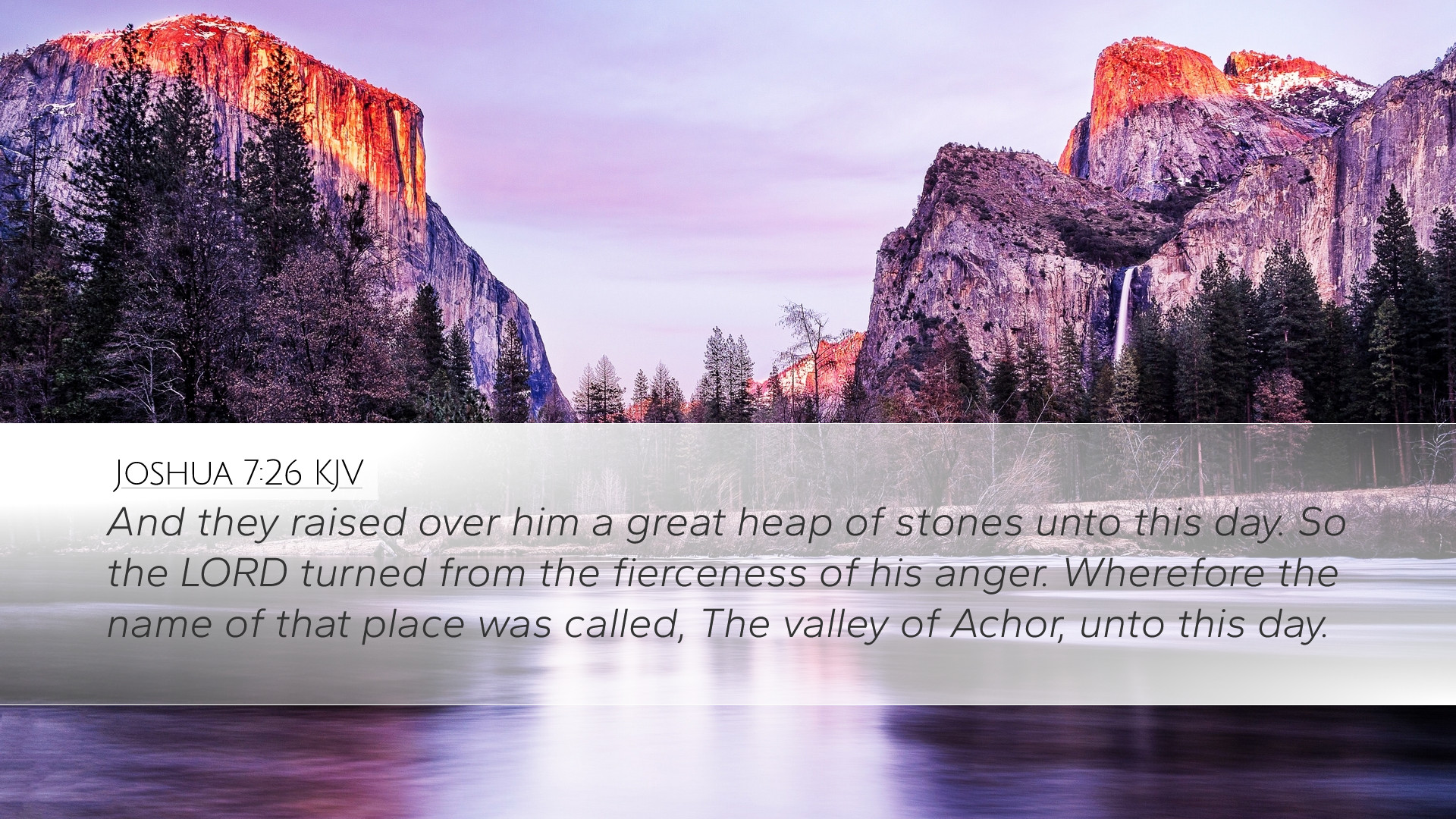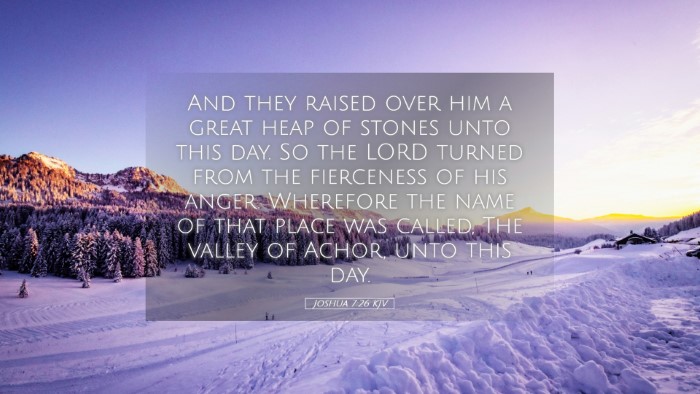Commentary on Joshua 7:26
Verse Context: Joshua 7:26 states, "And they raised over him a great heap of stones unto this day. So the LORD turned from the fierceness of his anger. Wherefore the name of that place was called, The valley of Achor, unto this day." This verse concludes the events surrounding the sin of Achan, which led to Israel's initial defeat at Ai.
Overview and Significance
This passage serves as a powerful reminder of the consequences of sin and the divine justice of God. Achan's transgression brought about a national calamity, and his subsequent judgment illustrates the gravity of sin even within the covenant community. The heap of stones marks a significant moment in Israel's history, serving both as a monument to divine judgment and as a symbol of God's holiness and the restoration of His favor.
Commentary Insights
1. Matthew Henry's Comments
Matthew Henry emphasizes the importance of the heap of stones as a lasting memorial to divine judgment. He states that this monument served as a reminder for the Israelites of the severity of their covenant obligations. This act of raising a heap of stones is symbolic of the permanence of God's justice; it implies that such sin should never be forgotten. Henry further notes that Achan's sin is a representation of how personal sin can affect the entire community, urging believers to consider the wider implications of their actions.
2. Albert Barnes' Observations
Albert Barnes explores the naming of the valley as the "valley of Achor," which means "valley of trouble." He suggests that this renaming serves a dual purpose: it recalls Achan's sin while also reminding the Israelites of the importance of obedience to God. Barnes points out that this incident highlights God's anger against sin, but it also signifies the point at which God’s anger subsided following judgment. This passage illustrates God's desire for restoration after discipline. Barnes quotes the notion that God does not take pleasure in the death of the wicked but desires them to turn from their wicked ways, signifying a dimension of grace even in moments of correction.
3. Adam Clarke's Interpretation
Adam Clarke places emphasis on the significance of the heap of stones raised over Achan. He notes that such practices were common in ancient times and served both commemorative and practical purposes. The stones acted as a visible barrier to forgetfulness, signifying that Achan's actions would not be easily dismissed. Clarke explains that the valley of Achor later becomes a place of hope in subsequent scripture, linking it to God's redemption. He draws parallels between this valley and later prophetic scriptures that speak of hope emerging from barrenness, indicating God's power to transform even places marked by judgment into places of blessing.
Theological Reflections
This passage invites deep theological reflection on several key themes:
- The Nature of Sin: Sin, as demonstrated through Achan's actions, has serious repercussions affecting not only individuals but also communities. This prompts a broader understanding of corporate and individual sin.
- Divine Justice and Mercy: The stone heap serves as an enduring illustration of God's justice. However, it also lays the groundwork for understanding divine mercy as God soon restores Israel's favor after the sin is dealt with decisively.
- Covenant Relationships: The narrative illustrates the depth of covenant responsibilities—individuals within a covenant community are interlinked, and one's failure to abide by these commitments impacts the whole.
- Memorials and Reminders: The heap of stones serves as a reminder for future generations about God's holiness and the seriousness of sin, emphasizing the essential practice of remembering divine acts in history to edify faith.
Conclusion
Joshua 7:26 provides a poignant narrative that reverberates through the theological landscape of scripture. The severing of Achan's transgressions and the establishment of a memorial serve as timeless reminders of the significance of holiness and the need for communal fidelity to God's commands. As we ponder the lessons borne from this text, let pastors, theologians, and students recognize the weight of their responsibilities within their communities, the path to restoration available through obedience, and the hope that exists even after judgment.
Practical Application
This verse challenges contemporary believers to:
- Examine personal and community behaviors that may lead to spiritual defeat.
- Understand the corporate nature of the church and its collective actions.
- Embrace a culture of accountability and transparency as essential for spiritual health.
- Remember and teach the importance of God's holiness and justice in a balanced view of God's character.


